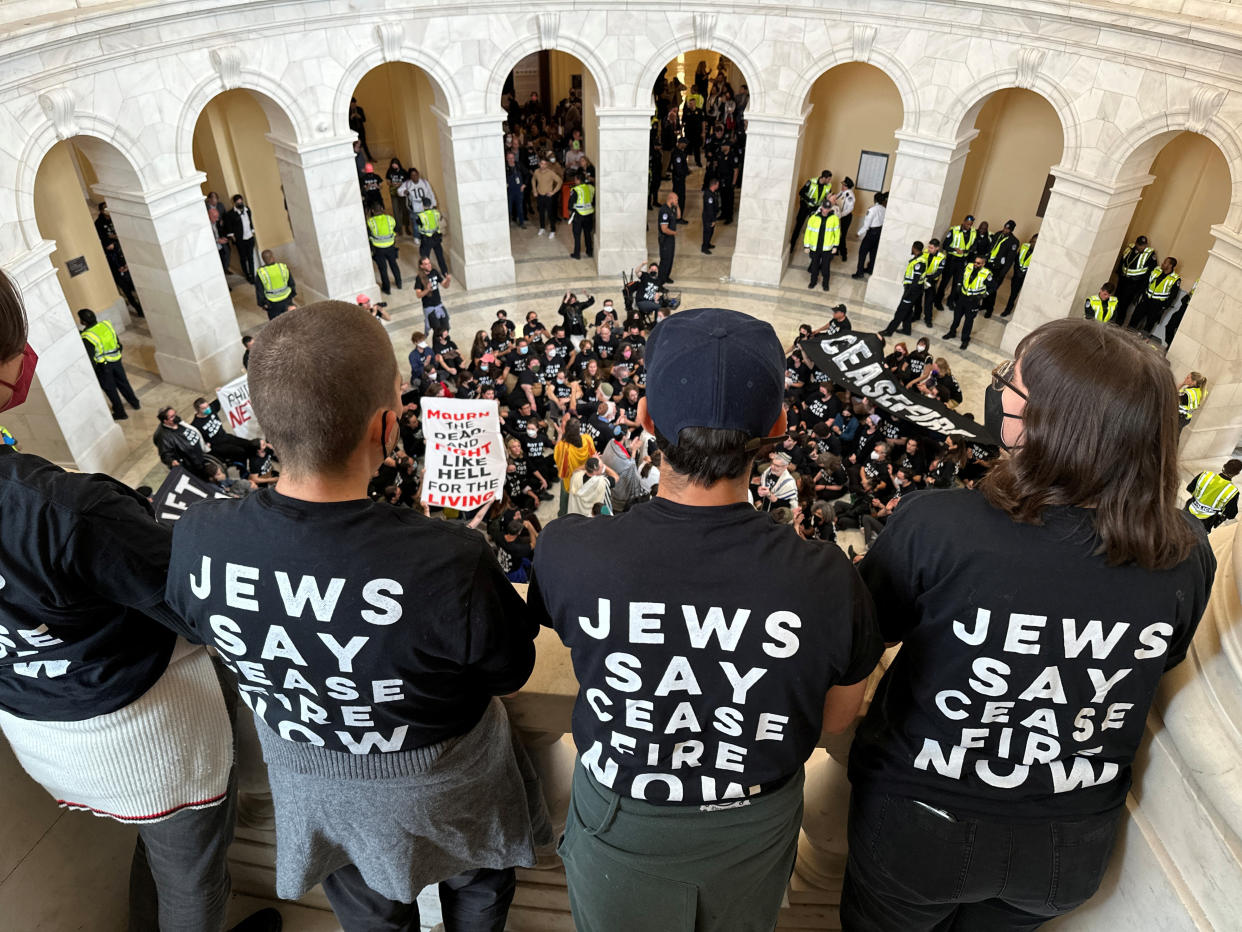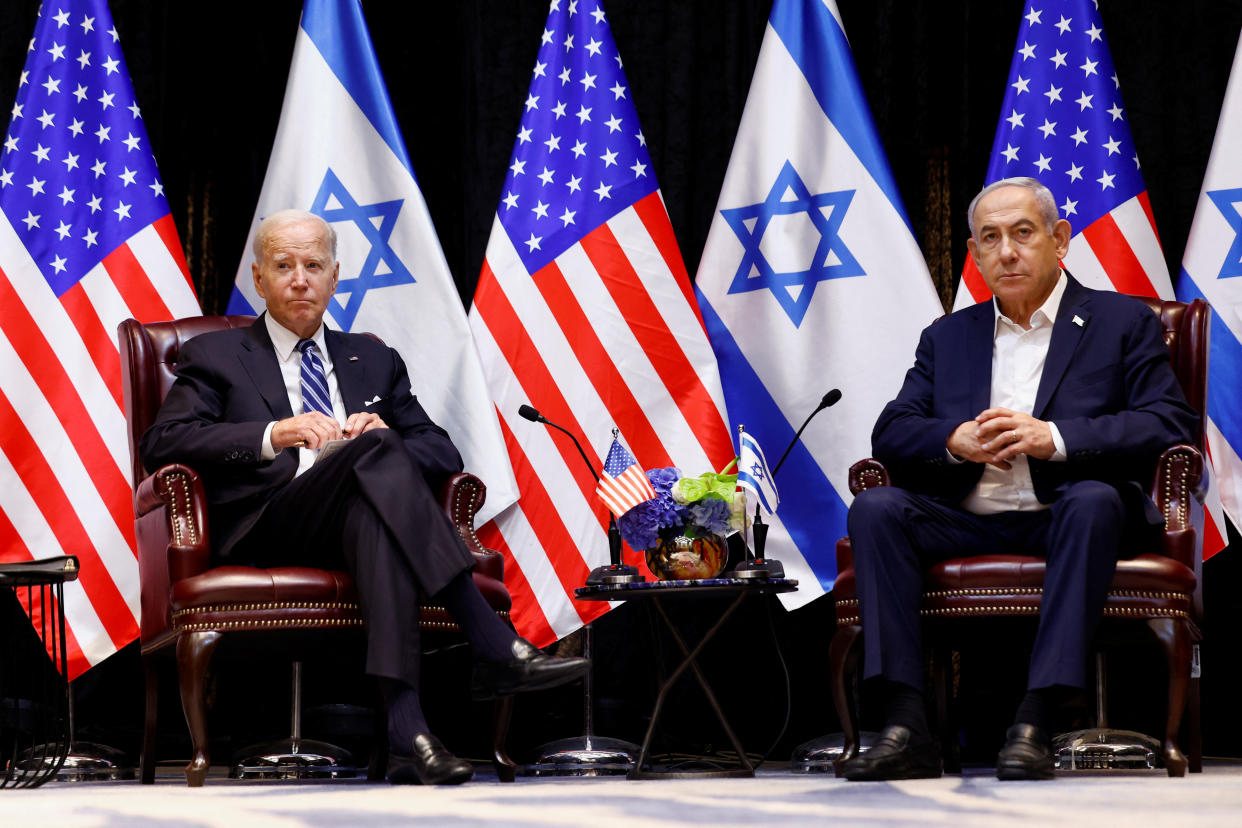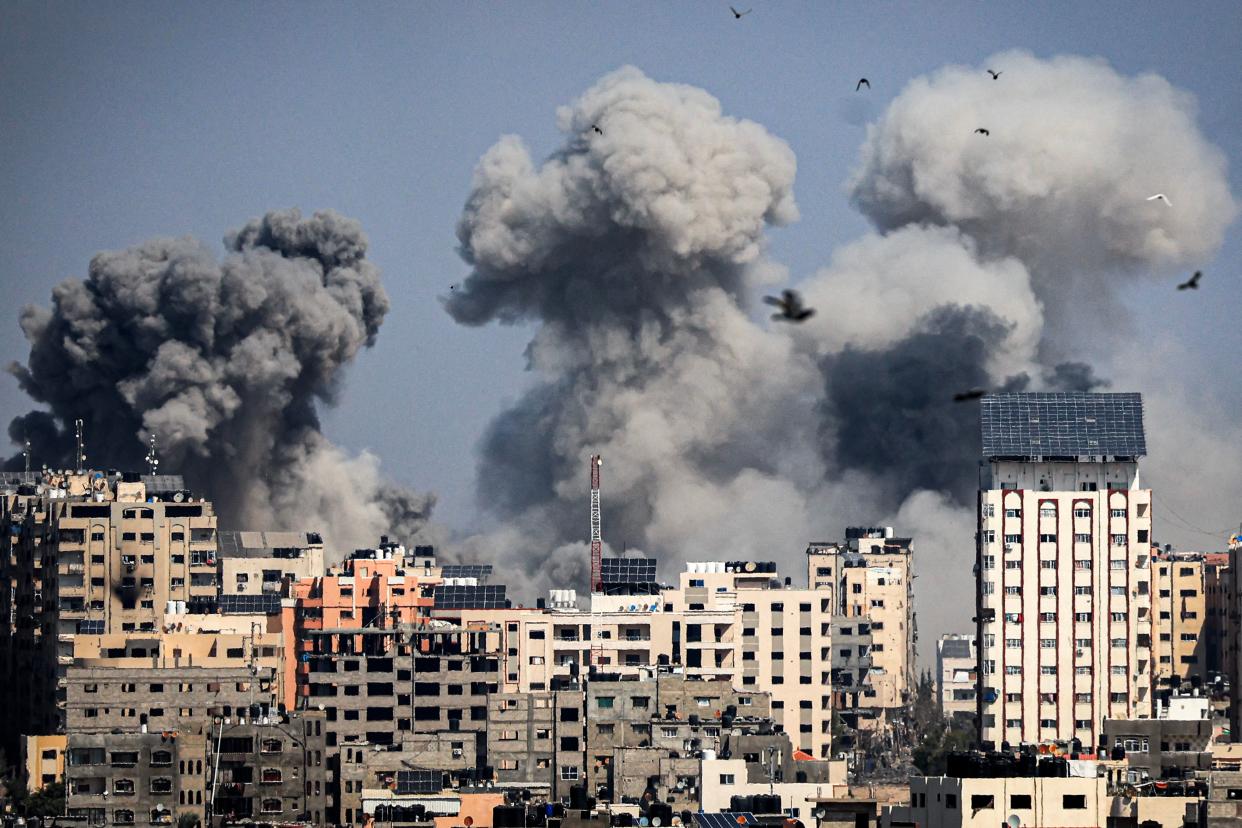U.S. response to Israel-Hamas conflict faces scrutiny amid growing concern over Gaza death toll
President Biden is attempting to balance his administration’s support of Israel with growing concerns about the safety of civilians in the Gaza Strip as violence in the region continues to escalate.
Biden visited Israel Wednesday and was set to hold a meeting with Arab leaders in Jordan, which was postponed after an explosion at al-Ahli Hospital in Gaza killed hundreds of Palestinian patients and refugees. While authorities in Gaza said an Israeli air strike caused the explosion, Israeli authorities said it was caused by a failed rocket launched by Hamas. Meanwhile in Washington, Arab American groups and some Biden administration staff members have expressed frustration with the White House’s approach to the conflict.
'We feel great damage has been done'

Hours after the Oct. 7 Hamas attacks in southern Israel, which left more than 1,400 dead including at least 31 U.S. citizens, Biden asserted support for Israel, saying the “United States stands with the people of Israel in the face of these terrorist assaults. Israel has the right to defend itself and its people. Full stop.” Biden echoed those remarks in the ensuing days and, at an event with Israeli Prime Minister Benjamin Netanyahu Wednesday in Tel Aviv, said, “We will continue to have Israel’s back as you work to defend your people.”
Biden’s initial response to the attacks was praised by many Democrats and Republicans alike. According to a new Yahoo News/YouGov poll, 52% of Democrats say Biden’s response to the situation has been “about right”; with just 15% saying it has been “too pro-Israel.” (41% of Republicans said the president’s response has “not been pro-Israel” enough.) Overall, 67% of Americans now consider “helping to protect Israel” to be an important goal for “U.S. policy towards the Middle East,” up 12 points from 55% in May 2021.
However, the White House has also faced increasing scrutiny for its handling of the crisis from a range of groups, including progressive lawmakers and Arab American leaders. More than 3,300 deaths have been reported in Gaza since Israel began their retaliatory strikes more than a week ago.
A group of House Democrats is pushing the White House to call for a ceasefire in the region amid the continuing violence. When asked at a briefing last week about statements made by members of Congress who called for a ceasefire and did not explicitly back the administration’s call to support Israel, press secretary Karine Jean-Pierre said, “We believe they are wrong, we believe they’re repugnant, and we believe they’re disgraceful.” A State Department memo that reportedly circulated last week discouraged diplomats from calling for a de-escalation.
Hundreds of people joined a protest led by a group called Jewish Voice for Peace at the U.S. Capitol on Wednesday afternoon, saying they would not leave until a ceasefire was declared. A similar protest was held outside the White House on Tuesday.
Politico reported Wednesday that Warren David, president of Arab America, told the White House that his organization was “outraged — outraged — to say the least at the rhetoric that's been coming out the last few days” from the administration.
“We feel great damage has been done regarding the image of Arabs in the United States,” David said, per the report. “In some ways, it's worse than what happened [after] 9/11.”

HuffPost reported Wednesday that White House personnel “worry about retaliation at work for questioning Israel’s conduct amid the U.S.-backed Israeli campaign to avenge an Oct. 7 attack by Hamas,” adding that the fear was prevalent among Muslim staffers. On Sunday, presidential personnel office chief Gautam Raghavan organized a call to discuss the concerns with current and former high-level Muslim appointees.
Robyn Patterson, a White House spokesperson, responded to the HuffPost story by saying Biden had “assembled the most diverse presidential administration in history and is proud of the open, collaborative role his appointees play in advising on policy and strategy ― including Muslim and Arab American team members. He will continue to use all available tools to combat hate against Muslim and Arab Americans.”
While laying out the administration’s plans at an event Tuesday evening at Northern Arizona University, Vice President Kamala Harris was jeered, with one attendee shouting, “Stop making bombs.” Polling has shown younger voters more likely to oppose the U.S. sending military aid and weapons to Israel in response to the violence.
Biden was outspoken in his condemnation of the apparently Islamophobic murder of a 6-year-old Arab child in Chicago over the weekend, saying, “This horrific act of hate has no place in America and stands against our fundamental values: freedom from fear for how we pray, what we believe and who we are.”
”As Americans, we must come together and reject Islamophobia and all forms of bigotry and hatred. I have said repeatedly that I will not be silent in the face of hate,” Biden said in a statement. “We must be unequivocal. There is no place in America for hate against anyone.”
A canceled summit

The president was set to meet on Wednesday with Jordan's King Abdullah II, Egyptian President Abdel Fattah el-Sissi, and Palestinian Authority President Mahmoud Abbas, who announced three days of mourning following the blast. NBC News and CBS News were among the outlets that reported the postponement was a mutual decision. The event was scuttled less than 24 hours after it was announced.
"After consulting with King Abdullah II of Jordan and in light of the days of mourning announced by President Abbas of the Palestinian Authority, President Biden will postpone his travel to Jordan and the planned meeting with these two leaders and President Sisi of Egypt," a White House official said in a statement, adding that Biden “looks forward to consulting in person with these leaders soon, and agreed to remain regularly and directly engaged with each of them over the coming days."
During the event Wednesday in Tel Aviv with Netanyahu, Biden said the explosion “appears as though it was done by the other team, not you. But there's a lot of people out there who are not sure. So — we've got to overcome a lot of things." When asked about the basis for his confidence, Biden cited "The data I was shown by my Defense Department.”
Later Wednesday morning, a spokesperson for the National Security Council said, “While we continue to collect information, our current assessment, based on analysis of overhead imagery, intercepts and open source information, is that Israel is not responsible for the explosion at the hospital in Gaza yesterday.”
During his visit to Tel Aviv, Biden announced that Israel and Egypt were allowing $100 million in humanitarian aid to be moved into Gaza and the West Bank. The president likened the situation to how Americans felt after the Sept. 11 attacks, saying, “You can't look at what has happened here ... and not scream out for justice. While you feel that rage, don't be consumed by it.”


